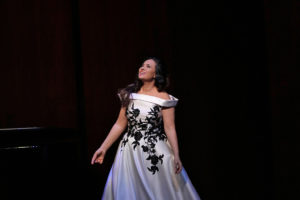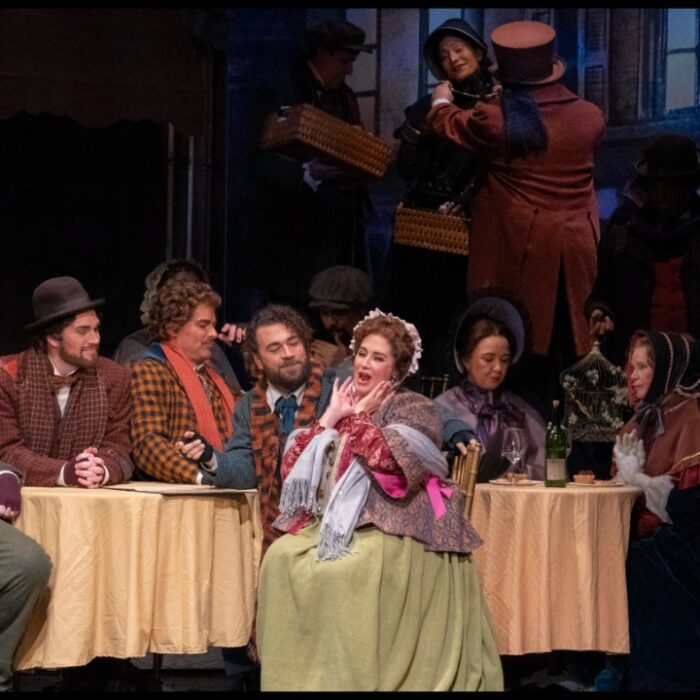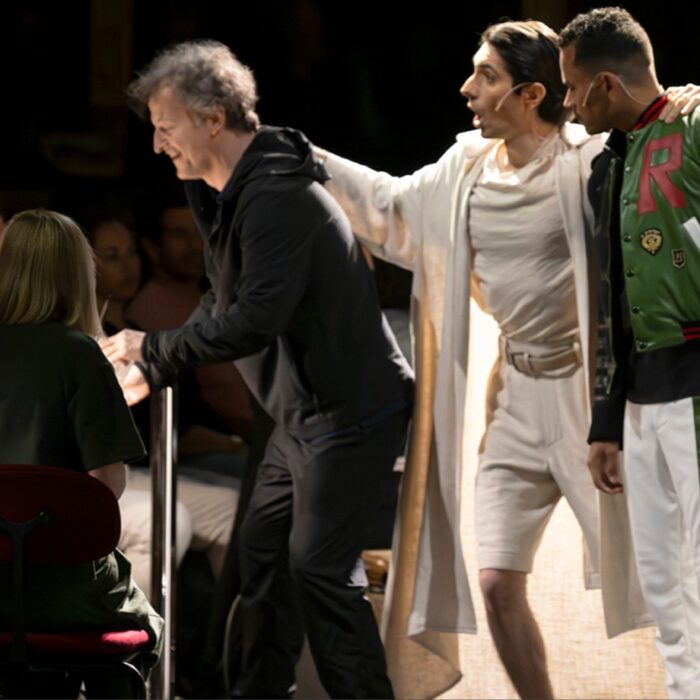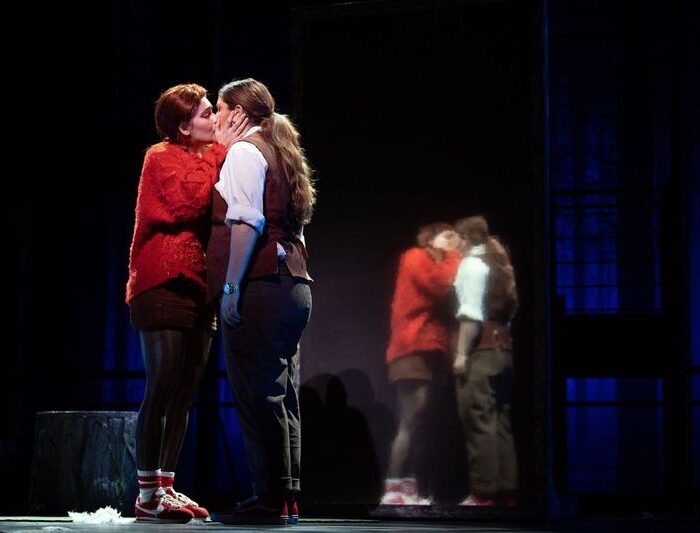
Metropolitan Opera 2021-22 Review: Sonya Yoncheva and Malcolm Martineau in Recital
Star Soprano Shines in Program of French and Italian Art Songs
By Logan MartellOn Jan. 23, 2022, soprano Sonya Yoncheva returned to the stage of the Metropolitan Opera for a special recital of French and Italian art songs, joined by pianist Malcolm Martineau.
French Finesse
Opening the program were four selections from Henri Duparc. The first, “L’invitation au voyage,” quickly set a tender yet urgent atmosphere through the running accompaniment, over which Yoncheva delivered impassioned tones, all of which settled for a ponderous shift into the middle section, carried by gentle, lyrical phrases. The imagery of journey and rest alike were treated with great delicacy to close this opening number. The second song, “Au pays ou se fait la guerre,” was full of rich longing, relating the absence felt by one whose lover has gone to war in another land. These feelings were conveyed wonderfully by Yoncheva, as the possibility of the lover’s return heard expression through the building tempo and tremolo, a hope that was denied as the number was brought to a soft and somber conclusion.
The third number, “La vie anterieure,” featured opulent imagery in the text by Charles Baudelaire, which Yoncheva illuminated through a highly-present sense of their wonder over Martineau’s rolling arpeggios. The luxury related was ultimately darkened by feelings of dissatisfaction as the piece slowly tapered to an end. Last among the Duparc selections was “Chanson triste,” where Yoncheva excelled in the phrases of great affection which yearned for connection, such as “You will lay my anxious head, oh! Sometimes upon your lap, and you will utter to it a ballad that will seem to speak of us.”
Following this was Pauline Viardot’s “Hai luli!” This sprightly number of a parted lover carried with almost humorous charm as thoughts of possible infidelity brought forth the desire to burn the lover’s village down, her shifting concerns interrupted by the passionate, evocative calling of the title phrase, capping off with a bereft conclusion and a strong reception from the audience.
Next on the program were three songs by Ernest Chausson, the first of which, “Les temps des lilas” from “Poeme de l’Amour et de la Mer,” featured mournful, floral imagery and languid, tragic energy from Yoncheva as she reflected on a love that is no more. The second song, “Le charme,” was brief and featured an upbeat accompaniment with a highly-sensory text, which gentled beautifully with the dawning realization of love. Last was “Serenade italienne, Op. 2, No. 5,” where the calm, marine imagery was spun into a charged, romantic atmosphere, full of wave-like rises and falls in the music.
Among these French works was a seldom-heard piece from Gaetano Donizetti, published posthumously as a set in the 1970s, “Depuis qu’une autre a su te plaire.” Here the sense of both love and abandonment were taken to intoxicating heights as Yoncheva related the sorrow of a dying lover whose longing to see their beloved was expressed through a poignant vocal ache through the pleading phrases, all of this leading into a delicate and appropriate morendo.
Bringing the first half of the program to a close was Leo Delibes’ “Les filles de Cadix.” Here, the quick passionate accompaniment was matched by the sultry phrases from Yoncheva, her ornaments delivered in a relaxed yet fiery stream, bolstered by her flirtatious bearing and gestures.
Italian Artistry
The second half of the program was dedicated to Italian works, beginning with four songs from Giacomo Puccini. The first of these, “Sole e amore,” saw a fine contrast in the jaunty accompaniment and Yoncheva’s lyrical delivery of the invocation to light and love. The next number, “Land and Sea,” flowed swiftly through its imagery of a dream of the sea interrupted by the wind. The third piece, “The warning was false,” bore more anguished feelings through its longer introduction, the narrator’s desolate fears and passions eliciting tones of soaring grief from Yoncheva, as well as sighs of haunted delicacy. Rounding out the Puccini works was “Canto d’anime,” where the proud, chordal introduction softened to accentuate the building imagery of overcoming the darkness, leading into a truly powerful and sonorous conclusion.
Next on the program was Giuseppe Martucci’s “Al folto bosco, placida ombria Op. 68, No. 6.” The lush introductory material and Yoncheva’s affectionate delivery quickly melded together to re-establish the sense of love and private spaces heard in earlier selections, tinged with a sad nostalgia and a splendid sense of emotional investment in what used to be. The contrasting feelings of longing and resignation were wonderfully complemented by the darkening fall of the accompaniment as it gently transitioned back to its earlier material.
Following this were two songs by Paolo Tosti. The first song, “L’ultimo bacio,” was brief yet filled with a sweet sense of both love and absence, feelings that shone warmly through Yoncheva’s poignant expression. The second, “Ideale,” allowed Yoncheva to showcase breathtaking delicacy of tone, utilizing a delivery that was rapt in the beauty of the text while remaining present enough to feel its full effect.
Bringing the program to a close were three songs by Giuseppe Verdi. The first, “In solitaria stanza,” bore great pleading through its sustaining phrases and imagery of a scorched garden. The following song, “Ad una stella,” made a fine contrast for its cooler, gentle beauty, with Yoncheva putting great admiration into the swelling repetitions of praise, ending this invocation with a gossamer finish. The final number, “L’esule,” was an encapsulated journey in itself, heard through her enchanted, lyrical opening and utter illumination of Solera’s text with remarkable passion.
The evening’s concert saw three encores from Yoncheva and Martineau. The first, “Donde lieta usci” from Puccini’s “La boheme,” was beautifully and affectionately delivered through the phrases of bittersweet departure. The second, the “Habanera” from Bizet’s “Carmen,” saw Yoncheva utilize a relaxed, nearly conversational tone, matched with a seductive flair through her playful gestures as she toyed with Martineau. Ending the encores was “Adieu notre petite table,” from Massenet’s “Manon,” which made for a truly tender farewell as Yoncheva sweetly wrapped up the recital.



